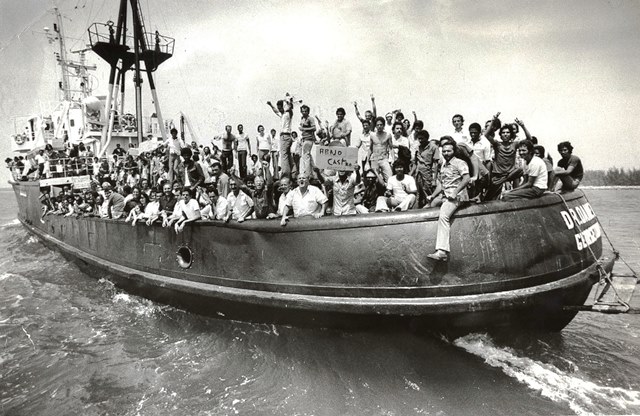The Mariel Exodus, 35 Years Later: Impacts in the U.S. and Cuba
| Start: | |
|---|---|
| End: | |
| Venue: | FIU Modesto A. Maidique Campus, Graham Center 150 |

Download the symposium program here.
A massive migrant wave from Mariel harbor in Cuba to Key West, Florida, took place between April 21 and October 31, 1980. The immediate cause of the exodus was the takeover of the Peruvian embassy in Havana by more than 10,800 Cubans who wanted to migrate. On April 20, the Cuban government opened the port of Mariel, near Havana, for anyone who could be picked up by relatives living abroad.
The Mariel exodus brought 124,779 Cubans to Key West. Most of the Marielitos (as they were pejoratively labeled) were young, single men with a working-class background and an elementary education. Approximately 20 percent classified themselves as black or "other" (most likely mulattos), compared to only 7 percent of the Cubans who arrived between 1960 and 1964. Contrary to media reports, less than 2 percent of the Mariel immigrants were common criminals, although 25 percent had been imprisoned for various reasons, including ideological discrepancies with the government and "antisocial" behavior such as public displays of homosexuality. Some of the immigrants were writers and artists.
Once in the United States, Mariel Cubans were labeled "entrants (status pending)," an ambivalent legal category that did not provide the benefits of political asylum. Initially, many Mariel Cubans faced unemployment, low-paid work, and welfare dependence. Most ended up working for themselves or their compatriots. Among other consequences, the 1980 exodus deepened the rifts between "old" and "new" Cubans in Miami, where most of the latter settled.
To commemorate the 35th anniversary of the Mariel boatlift, the Cuban Research Institute has convened several experts from various disciplines to reflect upon the significance of this historic event, both for the United States and for Cuba. Confirmed participants include:
- Dr. Jesús J. Barquet, New Mexico State University
- Dr. Julio Capó, Jr., University of Massachusetts, Amherst
- Dr. Eduardo Gamarra, Florida International University
- Dr. Hugh Gladwin, Florida International University
- Dr. Guillermo J. Grenier, Florida International University
- Dr. Lillian Guerra, University of Florida
- Ms. Kate Dupes Hawk, independent scholar
- Dr. Eliana Rivero, University of Arizona
- Dr. Abel Sierra Madero, New York University
This event is free and open to the public. To confirm attendance and for more information, please call (305) 348–1991 or write cri@fiu.edu.